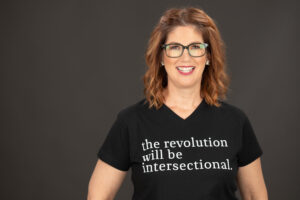Not only do today’s organizations value expertise in diversity, equity, and inclusion—they also require it of their communication leaders.
“Whether you’re measuring innovation, goal attainment, financial performance, or any number of metrics, diversity is great for business—and research proves it,” says Amy J. Hauenstein, adjunct lecturer and director of curriculum and non-degree programs for Northwestern University’s MS in Communication (MSC) program.
With a PhD in curriculum studies, Hauenstein has learned to question how curriculum is culturally, politically, and economically positioned—and how it impacts the audiences it reaches. As a result of her education, she brings a unique view to integrating diversity, equity, and inclusion (DEI) with curriculum.
Not only does she want to make sure Northwestern’s MS in Communication graduates are valuable and effective leaders, but she also wants them to understand how to use communication to reach different stakeholders to move and motivate them. “If not in a program dedicated to leadership, management, and communication,” she asks, “then where else does learning about diversity, equity, and inclusion belong?”
Hauenstein points out that MSC students are already an incredibly diverse group, superseding national averages in terms of gender, ethnicity, age, and racial identities. But, to make sure the concepts of diversity, equity, and inclusion are woven into MSC curriculum, she and former faculty director Dr. Michelle Shumate led a year-long case study research project in 2016 that involved faculty and an advisory board made up of industry leaders. The goal: to define what MSC students should be able to do with their degrees once they graduate—and what they should be able to produce in the real world.
“We pulled old course descriptions, faculty bios, and syllabuses, looking for commonalities over the 35 years of the program, and we looked to national associations and at the knowledge and behavior demands on leaders of industry,” she explains. “Up from that data bubbled core curricular themes and important points in terms of learning outcomes and dispositions.”
She then used this information to build impactful statements about what MSC does, what it believes, and what it values—and how these factors align with the student experience and Northwestern’s emphasis on diversity, equity, and inclusion. The work served as her foundation while she realigned courses, added new curriculum, and implemented capstone projects to help students understand how DEI values show up in the real world.
“Really, we took what already existed in our program and organized it in a different way,” she explains. “We developed co-curriculum activities focused on DEI—including workshops, seminars, speakers, opportunities to visit businesses, and career coaching—that complement what students already learn in class.”
“Usually, diversity training is about studying others. Instead, we focus on studying yourself in relationship to others.”
The end result: students learn to develop a critical consciousness. “Critical consciousness is the ‘it’ skill of today’s leaders,” she says. “Our students have the advantage of working through the development of critical consciousness with an expert support team to coach, encourage, and push them. They leave understanding how complex diversity, equity, and inclusion are—and that they must be woven through business practices, policies, and cultures.”
Because most MSC students work while they earn their degree—or worked full time before returning to earn a graduate degree—many have experienced “diversity training” before. “This is much different,” she says. “Usually, diversity training is about studying others. Instead, we focus on studying yourself in relationship to others. When you’re immersed in a deep self-study next to someone who’s doing the same thing, a visceral human connection is formed.”
Moving from diversity to inclusion has been a strategic priority at Northwestern and E. Patrick Johnson, the new Dean of the School of Communication, has declared the pursuit of diversity, equity, and inclusion a central tenet of his deanship. By first understanding DEI on an individual level, Hauenstein says MSC students learn to critically and respectfully challenge and interrupt inequitable and exclusionary norms and systems.
And although specific steps have been taken to integrate DEI concepts into the curriculum, it’s not touted as the focus of the program. “It’s a priority and value in all things we do. My grandma always said, ‘When you are who you say you are, you can stop announcing it,’ and I truly believe that’s the case here,” says Hauenstein. “I don’t know of any other program that is so intentional about working students through this practice. We just want to be diverse, equitable, and inclusive. It’s who we are.”
To hear more from Amy Hauenstein, please join us for the next Webinar Wednesday, where she will speak in more detail about the MSC curriculum. The webinar will be at 12 PM CST on Wednesday, November 4th. REGISTER HERE